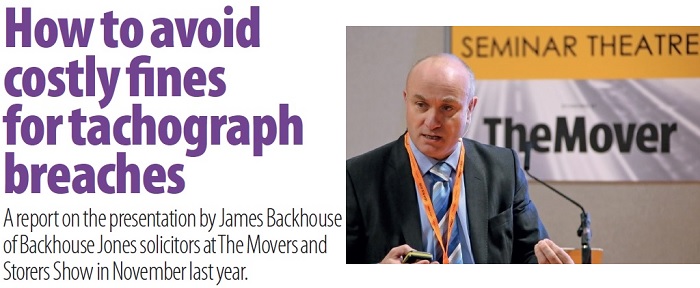A report on the presentation by James Backhouse of Backhouse Jones solicitors, at The Movers and Storers Show in November last year.

Perhaps surprisingly, there is no official guidance to help those responsible for operating commercial vehicles to comply with tachograph regulations. However, the penalties for non-compliance can be severe with fines amounting to tens of thousands, or even hundreds of thousands of pounds being imposed on companies caught flouting the law or being negligent. This was highlighted in a presentation during last year’s Movers & Storers Show in Manchester by transport law specialist James Backhouse from solicitors Backhouse Jones.
During the presentation James gave his advice on how operators, and those in the moving industry in particular, can reduce their risk of falling foul of the law and avoid the potentially ruinous fines that could result from non-compliance.
James began by explaining how the Driver and Vehicle Standards Agency (DVSA) discover possible tachograph breaches and how they are investigated. He explained that often the DVSA is tipped-off by another operator who believes a company is breaking the rules and possibly gaining an unfair advantage by doing so. Routine roadside checks by enforcement officers are of course another common way of catching drivers and operators who are acting illegally. These are often followed-up with a letter from the Remote Enforcement Office (REO) requesting information in what James described as what looks like ‘a rather innocuous letter’. James said, “The letter needs to be answered fully and promptly – within 14 days – and must not be trivialised or ignored as to do so may result in a full-scale investigation and possible prosecution.”
James gave the audience a number of tips to help ensure tachograph compliance and avoid costly errors which included:
Induction process
Every driver must undergo an induction process to make sure they fully understand what is required of them before being allowed to drive any of your company’s vehicles. It must include an assessment of their drivers’ hours knowledge and record keeping, as this is something that is often a problem in the removals sector.
Journey planning
Journey planning must be carried out by a competent, knowledgeable person to ensure journey times are realistic and that drivers are not put under pressure. While a delay caused by a road accident may be defensible, hold ups caused by roadworks will probably not be.
Correct digi card or analogue disc
Make sure the correct didgi card or analogue disk is being used. Each card or disc has an E number which must match the E number on the tachograph. Some drivers fraudulently obtain a second card which they use to drive for other operators and it is important that transport managers are aware of this.
Use an online checking system
Use a proper electronic online checking system to manage tacho data, driving licences, CPC, etc. even if your drivers are driving smaller vans. Such systems are now inexpensive to implement and are much more efficient than manual systems. When asked, only a small number of people in the audience were currently using an electronic system for this purpose. James urged everyone to switch to an online system without delay.
Download data weekly
Download data on a weekly basis so that queries can be dealt with before people forget what happened. This should include both vehicle data and driver card data. Other work such as loading and unloading must be recorded by the driver manually as the tacho will only record a break when the vehicle is not being driven. Human input is therefore very important and failure to record activity accurately is an offence for which both the driver and employer can be prosecuted. Driver card data should also be download before a driver goes on holiday and again when they come back, so that any driving they do for someone else during their time away can be accounted for.
James’ presentation contained a great deal of information and advice on how to stay on the right side of the law when dealing with tachograph data management and brought sharply into focus the responsibilities of both drivers and their employers. Perhaps the most important point for those in the removals industry is the need for drivers to accurately record all their activities when not driving the vehicle, as this is one of the most common areas of non-compliance and subsequent prosecution.
Photo: James Backhouse presents to the Seminar Theatre.